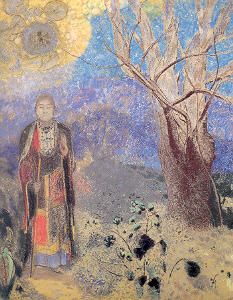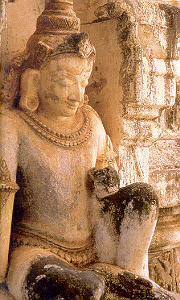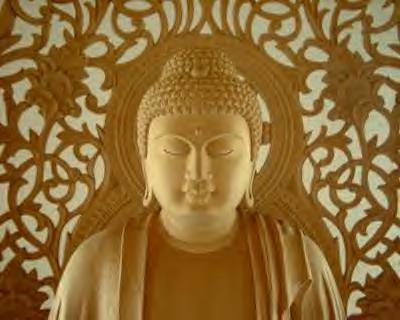The word 'Zen' is the Japanese attempt at pronouncing the Chinese word 'Chan', which in turn is the Chinese attempt at pronouncing the Sanskrit word 'Dhyana', which translates as 'meditation'. And indeed, the word Zen conjures up an image of motionless Buddhist monks lost in deep meditation.
www2.bakersfieldcollege.edu/resperic/what_is_the_meaning_of_zen.htm

| Chinese name | |
|---|---|
| Simplified Chinese | 禅 |
| Traditional Chinese | 禪 |
WIKIPEDIA: Chan (simplified Chinese: 禅; traditional Chinese: 禪; pinyin: Chán; abbr. of Chinese: 禪那; pinyin: chánnà), from Sanskrit dhyāna,[1] meaning "meditation" or "meditative state"[2]) is a school of Mahāyāna Buddhism combined with Taoism. It developed in China from the 6th century CE onwards, becoming dominant during the Tang and Song dynasties. After the Yuan, Chan more or less fused with Pure Land Buddhism.
Chan spread south to Vietnam as Thiền and east to Korea as Seon, and, in the 13th century, east to Japan, where it became known as Zen.
Below is from: http://www.izauk.org/multimedi...e-four-noble-truths/
Four Noble Truths of Buddha…
According to the story, he sat through the night. In the morning when he gazed at the morning star, he realised “the unsurpassable and great awakening”, and was filled with understanding. In the sermon at Benares, he shared his awakening with those who he’d been practising with before. This was the first sermon that he gave.
The Buddha captured the essence of his understanding in this first sermon, and summarised it in the form of the Four Noble Truths. Firstly, what is meant by ‘Noble’? It doesn’t necessarily mean that it’s the truths that are noble – though they are. Another way of interpreting this is that they are the truths that make a human being noble. They are truths which awaken us if we engage wholeheartedly with them, rather than “truths” that should be worshipped and believed as dogma.
The First Truth is the truth of ‘dukhka’ – Life is duhkha.
‘Dukhka’ is often translated into English as ‘suffering’, but this doesn’t capture all of its meaning. It includes suffering, but it encompasses more than that. ‘Dukhka’ means a sense of dis-ease, a sense of dissatisfaction. Some of that can be from real suffering in life, the profound suffering from the deep difficulties that life throws at us. Death, illness, infirmity… all inevitable parts of life. Death of friends, death of relatives, death of loved ones… It includes this real suffering, but it also includes more everyday dissatisfaction – that’s the thing. It’s not only this deep suffering, but everyday dissatisfaction – which just makes us not quite OK with life, not quite accepting what life throws at us.
There are things that we want and we don’t quite get them, they pass us by. Or we get them, and then we lose them again. There’s even a sense, it says in Buddhism, that having what you do want also creates suffering, because there’s the fear of losing it again. You can’t escape this kind of dissatisfaction. The desire to have something that you don’t have, the desire to avoid those things you don’t want, the desire to keep those things which you like, and the fear of losing what you have. All of this can lead to a sense of dis-ease in the mind, that we all live with. From a Buddhist point of view, this dis-ease comes from a sense of a mismatch between our idea of how we would like reality to be and how reality actually is. We create mental constructions of how we would like the world to be, and the world never lives up to them. We never live up to those constructions that we make. So these constructions cause us suffering.
One of the key aspects of this is that we create an image of our self, our ego. We create an image of our self, of how we believe we are. We believe this ego is something that is eternal, everlasting. If we were quizzed on this we wouldn’t necessarily say that. We wouldn’t say “Oh, I’m going to live forever.” But this illusion of a permanent self has a hold over us on a visceral level, and deeply influences our thoughts, actions and way of being in the world.
So we cling onto these ideas of how life should be, and of how we should be. We grasp some ideal image of how things should be, and want to hold onto it forever. And that’s what causes this dissatisfaction in life. So that’s what the First Noble Truth is. If we see this suffering, see the nature of this dissatisfaction in ourselves, and observe it, then we encounter the First Noble Truth – the fact that this dissatisfaction is always present within us, in our everyday lives.
The Second Truth is: where does this suffering come from?
The Buddha described the source of this dis-ease as ‘thirst’ – the thirst for something that we don’t have, or the thirst to keep something that we do have. This thirst causes us suffering. However, – this is very important – it’s not that we should not enjoy or take pleasure in things. That is not the problem. Buddhism is not, as some people believe, a philosophy or religion of denial. The problem is that pleasure or enjoyment can result in us chasing after things or running away from things. So it’s the attachment to the pleasure or enjoyment, not the pleasure or enjoyment itself. It’s the thirst for the pleasure or enjoyment, not the pleasure or enjoyment itself.
So this is the origin of suffering. It’s the chasing after those things which give us pleasure, those things which we believe will make us happy, those things which we think we ought to be. Chasing after it, holding onto it, fear of losing it, and the fact that even when we have these things they never really satisfy us.
Those of you who know me well know I’m rather keen on chocolate. That’s one of the things that gives me pleasure. I very much enjoy the flavour of chocolate, but if I eat a whole bar, it loses its enjoyment. The pleasure it gave me to begin with is no longer there.
So believing that these things will keep on giving us pleasure, we can become addicted to them in some way. But they never really fully satisfy, they never really fully satisfy this sense within us of imperfection, of lack.
These objects, these attachments, vary from person to person. We all are attached in some way to life. But we each are attached in a different way, and we must observe the way that we are attached for ourselves. Someone else can’t say how we are attached. We must observe in ourselves, through the awareness that comes from practice, through the awareness that comes from regular sitting.
Then we can observe the way that the thirst manifests itself in us. For some people it can be sensory pleasures: I gave the example of chocolate – that does it for me
sometimes. It can be sensory pleasures, trying to find sensory enjoyment in life. For some people it can be the accumulation of things – money, wealth, luxury goods. For other people it can be ambition, power. It might be power, the desire to have power over people, or it might be the desire for status or respect. All these things can trap us.
In fact Jean Baby (who was one of the founders of this dojo and of our Zen sangha in the UK) said that even the desire for knowledge, the desire for understanding can trap us. When he would give teachings, people asked him about studying the sutras. He used to say that having knowledge of the teachings, etcetera, is a good thing. He said it’s a kind of wealth – but ultimately the practice of Zen is not about acquiring wealth.
So in the same way that we can be attached to money, or to power, or to sensory pleasures, we can be attached to knowing more about Buddhism, or knowing more about anything. It can also be a thirst to be awakened, “enlightened”. It’s important to observe how these things manifest in ourselves, and be aware of the arising of the thirst within us. It doesn’t mean you necessarily stop doing it, but it means you need to take some distance from it and study it deeply to understand the process. In some cases, it is necessary to stop doing it. It’s necessary to cut the link with that which you chase after. Other times, it’s possible to take a different relationship to it.
The thing about these thirsts, is that they can create conflict – they can create conflict within ourselves and they can create conflict between us and others The conflicts that arise can be small conflicts or they can be big conflicts. The Buddha observed this, saying that desire leads to anger. The conflicts come because our desire for the world (and other beings) to be as we want it to be leads to anger, and then to struggle with ourselves and those around us. Again, I want to draw on the teachings of Jean Baby. He used to say that wars aren’t fought by evil people, they’re fought by good people who want to impose their idea of good on someone else. People possessed by what he called
‘the Demon of Good’. You don’t go into war thinking “I’m an evil person.” You think you know what’s right for other people, and you try to impose your ideas on others.
By being rigidly attached to what we believe is right, whether it’s for ourselves or for others, we can cause suffering. One of the things that Zen teaches is that we need to be able to observe this in ourselves. It doesn’t mean we don’t take a stand, but we need to be able to be aware within our actions and to let go of the desire to impose what we believe is right on others.
The final thing that the Buddha said with regard to the origin of this suffering is that it comes from ignorance, avidya. The avidya he is referring to is ignorance of the impermanent nature of life, and of our own nature. We cannot impose some kind of structure on life that will always be there. Anything that we attach ourselves to, including our sense of self, will always pass.
We might intellectually be able to accept that, but do we really have a visceral feel for it in us? I think if we’re completely honest, all of us maybe have moments of that, but most of the time we believe that the schemes we create will last forever. You’ve got to play the game of life – the game of life is there to be played – but when you play it don’t take the schemes you create too seriously.The final thing that the Buddha said with regard to the origin of this suffering is that it comes from ignorance, avidya. The avidya he is referring to is ignorance of the impermanent nature of life, and of our own nature. We cannot impose some kind of structure on life that will always be there. Anything that we attach ourselves to, including our sense of self, will always pass.
We might intellectually be able to accept that, but do we really have a visceral feel for it in us? I think if we’re completely honest, all of us maybe have moments of that, but most of the time we believe that the schemes we create will last forever. You’ve got to play the game of life – the game of life is there to be played – but when you play it don’t take the schemes you create too seriously.
So those are the first two truths.
The First Truth which makes us noble is that our life has suffering in it, has at its core dissatisfaction. Can we observe this dissatisfaction in us, and how it manifests in us?
The Second Truth is where this dissatisfaction comes from. It comes from how we create a fixed view of our self, of reality and how we want reality to be. We thirst for reality to be a certain way. And the more that we rigidly impose our view on reality, the more we suffer.
The Third Noble Truth of the Buddha is that there is a way beyond this suffering.
The Buddha uses the word ‘nirvana’, which is ‘extinction’. The extinction he is referring to is the extinction of thirst. So nirvana is the extinction of the thirst for things to be different. It also can be described as the uprooting of attachment, the uprooting of the attachments that we have to how things should be.
This is interpreted in different Buddhist schools in different ways. The way that we in Soto Zen see it, is that practice and enlightenment are not different. So we don’t see it as something that is far outside us, that we work to achieve. We see it as something that is always already present in our existence as it is now. So even though our personal self suffers, there is something greater than this that does not suffer. It is this that reveals itself when we let go of the mind that creates schemes and categories, etcetera. This spaciousness beyond our personal self, a place of awakening, a place of emptiness, is always already present with us. It’s not something that you wait for a long time to experience.
It’s something that reveals itself in practice. It’s always there, glimpsed in moments. And with time those moments can come more often. They can be a source of inspiration in your life. You’ll always have work to do from the point of view of Zen. There’s never a kind of moment that suddenly everything is OK forever. As long as you’re alive there will be problems, which are both sources of suffering and opportunities for awareness. But the moments of letting go that come in practice are a source of inspiration which gives us the strength to be able to let go in daily life, when it’s appropriate, and come back to the silence within, beyond the personal ego. And maybe we play
our games more skilfully, with less attachment, with less anxiety.
Through the practice of Zen, Vast Mind reveals itself through us. This Vast Mind, the mind of being, manifests when our ego lets go of all categories, just for a moment. It doesn’t try to analyse or categorise, it doesn’t try to say what is good or what is bad. We let go of that. And that act of letting go of what is good, what is bad, and even the categories of ‘good’ and ‘bad’; letting go of the desire to make sense of the world for a little while. Just simply being present in the moment, experiencing life it as it is – is for us, nirvana. Through the practice of Zen, Vast Mind reveals itself through us. This Vast Mind, the mind of being, manifests when our ego lets go of all categories, just for a moment. It doesn’t try to analyse or categorise, it doesn’t try to say what is good or what is bad. We let go of that. And that act of letting go of what is good, what is bad, and even the categories of ‘good’ and ‘bad’; letting go of the desire to make sense of the world for a little while. Just simply being present in the moment, experiencing life
it as it is – is for us, nirvana.
There’s another Buddhist teacher, Mahayana teacher, called Nagarjuna who used the expression “samsara is nirvana” which translates as effectively “the everyday world that we’re in is also the world of freedom-liberation.” So it’s like one of those pictures that sometimes looks like a candle stick, and sometimes looks like two people about to kiss… Life is like that. The same situation is both riddled with suffering and imperfection, and also at the same time can be a source of freedom. Just by finding that space, within us, and letting go into that.
Obviously some situations are harder than others; there’s no doubt about it, some situations are harder than others. But nonetheless from a Buddhist point of view, in any situation, no matter how extreme, it is possible to let go, be present, and experience existence beyond suffering in that moment. Even though we may suffer deeply in that moment on a personal level.
So that’s the Third Noble Truth – that there is an end to suffering. From the Zen point of view that end is always already present in us, in every moment, and we can taste it through practice.
The Fourth Noble Truth is the Way, which leads us to that experience.
And the primary practice for this is the practice of zazen, seated zen. The Buddha talks about The Eightfold Path, of which one of those is dhyana, the practice of zazen.
In a later talk I will talk about what the Buddha said about the Eightfold Path, and how we experience it in Zen practice.





